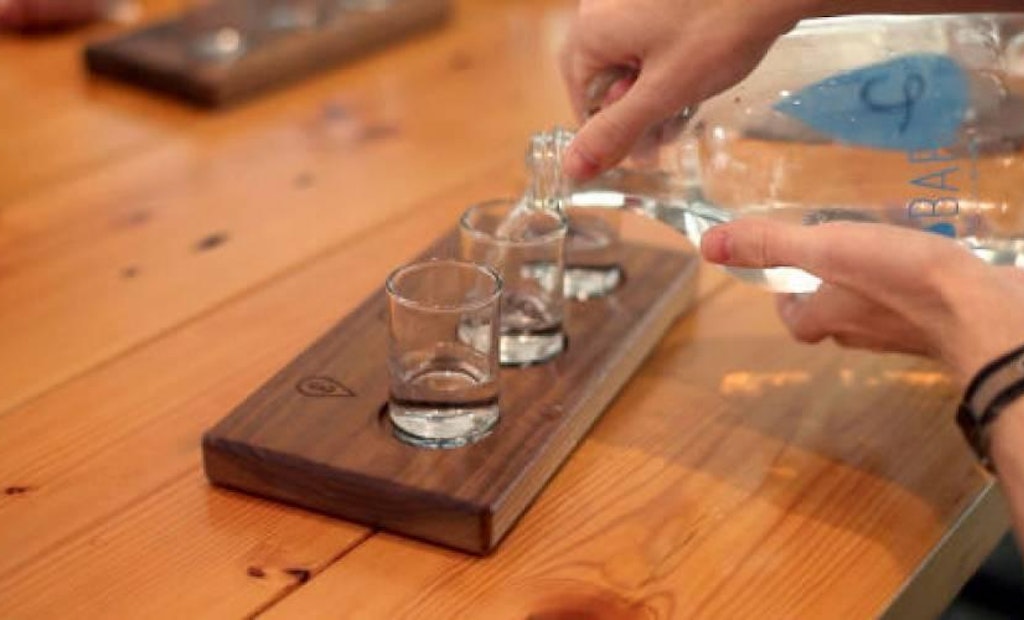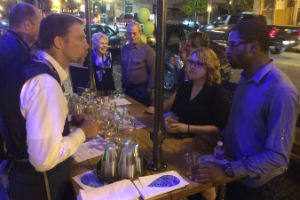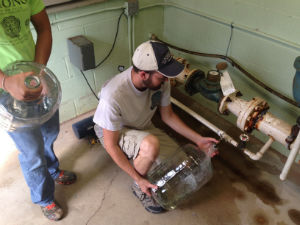
Interested in Education/Training?
Get Education/Training articles, news and videos right in your inbox! Sign up now.
Education/Training + Get Alerts
 You walk into the trendy space, the vibe of the city humming around you. The bartender strikes up a conversation, so you take the next natural step and order … tap water.
You walk into the trendy space, the vibe of the city humming around you. The bartender strikes up a conversation, so you take the next natural step and order … tap water.
That might sound odd, but it’s how things roll at the Water Bar in Minneapolis, Minnesota. The collaborative public art project serves tap water to spark conversations about the importance of local water and raise awareness about important water issues.
“When we say water is all we have, we really mean tap water,” says Shanai Matteson, who, along with fellow public artist Colin Kloecker of Works Progress Studio, developed Water Bar. “We’re not pretending it’s anything fancy. The bar is beautiful, and we care about the experience, but we’re not tricking anyone.
“We talk about the treatment of water and the importance of public water, but we also talk about the sources of drinking water and how we can protect those sources of drinking water by things that we do in our daily lives.”
Water Bar’s staff includes artists, water researchers, sustainability educators, community residents and, not surprisingly, water treatment professionals. In fact, many treatment professionals have served as Water Bar bartenders, including George Kraynick, water-quality manager at Minneapolis Water Treatment and Distribution Services.
“I think one of the key groups of people we really tried to reach in this project is professionals who work in drinking water and wastewater, just because we hope we can be a platform for those type of folks to connect with public audiences in a creative way,” Matteson says.
“One of the ways we (educate people about water) is by putting people directly in contact with those professionals. They’re not there to push a message but to have conversations that are friendly and laid back, like at a real bar. It’s a way for people to bring the questions they have about water … and to be able to get those questions answered by a professional who works for the city and other agencies.”
 Matteson and Kloecker started the concept in 2014. The first public Water Bar was part of Twin Cities Public Television’s TV Takeover program, curated by Works Progress Studio, according to water-bar.org. In fall and winter 2014, Water Bar was part of a national exhibition at Crystal Bridges Museum of American Art in Bentonville, Arkansas, in collaboration with the Illinois River Watershed project. In 2015, Matteson and Kloecker developed a new Water Bar at the Elsewhere Living Museum in Greensboro, North Carolina, in collaboration with Greensboro Water Resources and Guilford College’s Cape Fear River Basin Project. The latest iteration is in Minneapolis. During the past two years, Water Bar has served local tap waters to more than 30,000 people.
Matteson and Kloecker started the concept in 2014. The first public Water Bar was part of Twin Cities Public Television’s TV Takeover program, curated by Works Progress Studio, according to water-bar.org. In fall and winter 2014, Water Bar was part of a national exhibition at Crystal Bridges Museum of American Art in Bentonville, Arkansas, in collaboration with the Illinois River Watershed project. In 2015, Matteson and Kloecker developed a new Water Bar at the Elsewhere Living Museum in Greensboro, North Carolina, in collaboration with Greensboro Water Resources and Guilford College’s Cape Fear River Basin Project. The latest iteration is in Minneapolis. During the past two years, Water Bar has served local tap waters to more than 30,000 people.
“People are excited,” Matteson says. “They have fun with it. They come in, and it’s kind of playful, but we also talk about a lot of serious things. I think people are sometimes surprised by the way something so ordinary like drinking water can actually be the spark for so many different conversations. We turn on our taps, we get water, we drink it, we use it for all kinds of things, but we don’t consider it carefully. We really have been trying to help people see that everyday connection.”
Matteson says the Water Bar experience raises many issues, including pollution, the importance of protecting water sources and disparity in water quality between communities.
“It’s the kind of stuff we take for granted,” she says. “Also now with Flint (Michigan) and a number of things like it in the news, people have a number of questions about the safety of drinking water. Here in Minnesota, we’re fortunate to have really great drinking water. We talk about the importance of continuing to protect those sources of water and that we make it a priority as a community to be educated about those things.
“People also bring all sorts of other questions and experiences to it. It’s also about the social aspects of water — the way water tastes triggers a lot of memories for people. People end up sharing a lot of stories, too, about the water they love or that they knew very well growing up.”
Interest in the effort has increased, and Water Bar & Public Studios will soon have a permanent space in May at a building in northeastern Minneapolis. Organizers are seeking investors and building partnerships, and have started a Go Fund Me page for the new social enterprise project.
“With the new storefront opening, we’re actually going to be training a number of our neighborhood residents to be bartenders,” Matteson says. “It’s meant to be kind of fun … and the folks who will help share info with these volunteers are people from our public agencies, who help to educate the public about drinking water and their connection to these water sources.”
If you’re in Minneapolis, stop by Water Bar. You might not get to enjoy your favorite cocktail, but you’ll learn something about the drinking water we depend on and how it affects our lives in so many ways.





